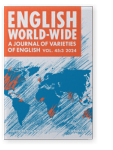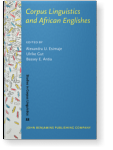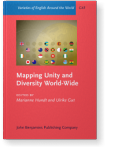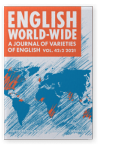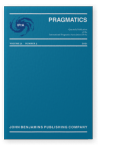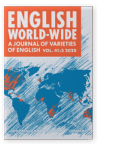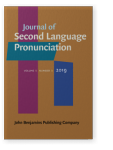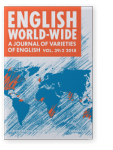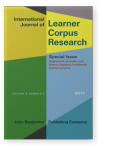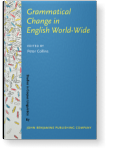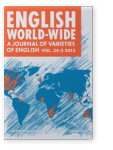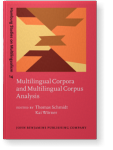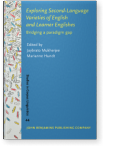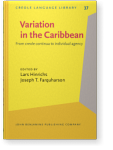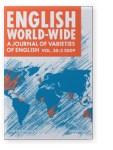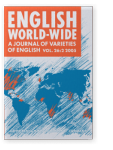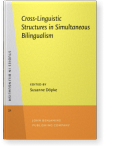Ulrike Gut
List of John Benjamins publications for which Ulrike Gut plays a role.
Journal
Titles
Corpus Linguistics and African Englishes
Edited by Alexandra U. Esimaje, Ulrike Gut and Bassey E. Antia
[Studies in Corpus Linguistics, 88] 2019. ix, 403 pp.
Subjects Corpus linguistics | English linguistics | Other African languages | Sociolinguistics and Dialectology
Mapping Unity and Diversity World-Wide: Corpus-Based Studies of New Englishes
Edited by Marianne Hundt and Ulrike Gut
[Varieties of English Around the World, G43] 2012. xiv, 294 pp.
Subjects English linguistics | Germanic linguistics | Sociolinguistics and Dialectology | Theoretical linguistics
2024 Expressing gratitude in Nigerian English English World-Wide 45:3, pp. 255–282 | Article
This study explores nativisation processes in the area of pragmatics. Focussing on expressions of gratitude, more than 1,300 thanking speech acts elicited from Nigerian speakers of English via Discourse Completion Tasks (DCTs) and 628 thanking speech acts identified in various text categories of… read more
2021 Rhotics in Standard Scottish English English World-Wide 42:2, pp. 121–144 | Article
The present study investigates rhotics in Standard Scottish English (SSE). Drawing on an auditory analysis of formal speeches given in the Scottish parliament by 49 speakers (members of parliament and the general public), it examines whether an underlying rhotic standard exists for SSE speakers… read more
2021 “ Abeg na ! we write so our comments can be posted!”: Borrowed Nigerian Pidgin pragmatic markers in Nigerian English Pragmatics 31:3, pp. 455–481 | Article
This paper examines three borrowed pragmatic markers from Nigerian Pidgin into Nigerian English, abeg, sef and na, with a view to exploring their meanings, frequencies, spelling adaptability, syntactic positions, collocational patterns and discourse-pragmatic functions in Nigerian English. The… read more
2020 Review of Jowitt (2019): Nigerian English English World-Wide 41:3, pp. 368–371 | Review
2019 Introduction: Corpus linguistics and African Englishes Corpus Linguistics and African Englishes, Esimaje, Alexandra U., Ulrike Gut and Bassey E. Antia (eds.), pp. 1–4 | Chapter
2019 Chapter 1.2. Corpus-based research on English in Africa: A practical introduction Corpus Linguistics and African Englishes, Esimaje, Alexandra U., Ulrike Gut and Bassey E. Antia (eds.), pp. 37–70 | Chapter
This chapter provides linguists and students not yet familiar with corpus-based research on varieties of English in Africa with a practical introduction to the field. After explaining the rationale and aims of corpus-based research on varieties of English (in Africa), we introduce methods, tools… read more
2019 Chapter 2.2. The use of stance markers in West African Englishes Corpus Linguistics and African Englishes, Esimaje, Alexandra U., Ulrike Gut and Bassey E. Antia (eds.), pp. 205–230 | Chapter
This chapter investigates the extent of similarity in the use of stance markers in two national varieties of West African English, Nigerian English and Ghanaian English, and compares them to British English. The frequency and stylistic variability of four semantic groups of stance markers were… read more
2019 Children’s and adults’ initial phonological acquisition of a foreign language Journal of Second Language Pronunciation 5:3, pp. 374–401 | Article
This study compared children’s and adults’ L2 perception and production in the first hours of exposure to a foreign language. A total of 10 German children and 19 German adults performed a phoneme discrimination task and a sentence imitation task in Polish at two testing times. Exposed to a… read more
2018 Commentary pragmatic markers in Nigerian English English World-Wide 39:2, pp. 190–213 | Article
This article investigates the use of commentary pragmatic markers in Nigerian English. The frequency and stylistic variability of five types of commentary markers – assessment, manner of speaking, evidential, hearsay and emphasis markers – were examined in ICE-Nigeria and compared with ICE-Great… read more
2017 Phonological development in different learning contexts: A corpus-based study Segmental, prosodic and fluency features in phonetic learner corpora, Trouvain, Jürgen, Frank Zimmerer, Bernd Möbius, Mária Gósy and Anne Bonneau (eds.), pp. 196–222 | Article
This paper examines the effect of learning context on the improvement of some L2 phonological parameters. Based on the Learning Prosody corpus (LeaP), it investigates the speech of 29 learners with various L1s who were recorded before and after either (i) a six to nine-month stay abroad, (ii) a… read more
2015 An apparent time study of the progressive in Nigerian English Grammatical Change in English World-Wide, Collins, Peter (ed.), pp. 373–388 | Article
This study explores the use of the progressive in Nigerian English in apparent time and investigates the influence of the variables age, gender, ethnic group and text category on its rate of use. Several regression analyses were carried out on a total of 4,552 progressive constructions drawn from… read more
2013 “We just don’t even know”: The usage of the pragmatic focus particles even and still in Nigerian English English World-Wide 34:2, pp. 123–145 | Article
This study investigates the usage of the pragmatic focus particles even and still in Nigerian English (NigE). A comparison of ICE-Nigeria and ICE-GB showed diverging frequencies of both particles across different registers between the two varieties of English and a significantly higher overall… read more
2012 The LeaP corpus: A multilingual corpus of spoken learner German and learner English Multilingual Corpora and Multilingual Corpus Analysis, Schmidt, Thomas and Kai Wörner (eds.), pp. 3–23 | Article
This article describes the compilation, annotation and some exemplary searches of the LeaP corpus, a multilingual 12-hour corpus of spoken learner German and learner English that contains extensive time-aligned phonological and phonetic transcriptions. After outlining the collection and type of… read more
2012 Relatives worldwide Mapping Unity and Diversity World-Wide: Corpus-Based Studies of New Englishes, Hundt, Marianne and Ulrike Gut (eds.), pp. 215–242 | Article
This chapter investigates relativization strategies in Nigerian, Jamaican, Philippine and Singapore English in order to test claims of reduced stylistic variability and an influence of norm-orientation in these New Englishes. Based on an analysis of these four International Corpus of English… read more
2012 Introduction: Mapping unity and diversity in New Englishes Mapping Unity and Diversity World-Wide: Corpus-Based Studies of New Englishes, Hundt, Marianne and Ulrike Gut (eds.), pp. ix–xiv | Article
2011 Studying structural innovations in New English varieties Exploring Second-Language Varieties of English and Learner Englishes: Bridging a paradigm gap, Mukherjee, Joybrato and Marianne Hundt (eds.), pp. 101–124 | Article
This chapter, which is of a theoretical-conceptual rather than an empirical nature, is concerned with the characterization of structural innovations in New English varieties and the question of whether they can be described as transfer phenomena and learner errors. It first gives a review of… read more
2011 Relative markers in spoken Standard Jamaican English Variation in the Caribbean: From creole continua to individual agency, Hinrichs, Lars and Joseph T. Farquharson (eds.), pp. 79–104 | Article
The aim of the study is to test the claim that Jamaican Creole is the dominant shaping influence on the emerging spoken Standard Jamaican English (SJE) and the opposing claim that its structural properties are the result of contact with standard English in schooling and literacy. Focussing on… read more
2009 Past tense marking in Singapore English verbs English World-Wide 30:3, pp. 262–277 | Article
This study is concerned with the occasional lack of verbal past tense marking in Singapore English, which has been described both as evidence for morphological change and as a phonological consequence of final plosive deletion. Based on a corpus of spoken educated Singapore English, it is… read more
2005 Nigerian English prosody English World-Wide 26:2, pp. 153–177 | Article
Nigerian English (NigE) prosody has often been described as strikingly different from Standard English varieties such as British English (BrE) and American English. One possible source for this is the influence of the indigenous tone languages of Nigeria on NigE. This paper investigates the… read more
2000 Cross-Linguistic Structures in the Acquisition of Intonational Phonology by German-English Bilingual Children Cross-Linguistic Structures in Simultaneous Bilingualism, Döpke, Susanne (ed.), pp. 201–225 | Article
